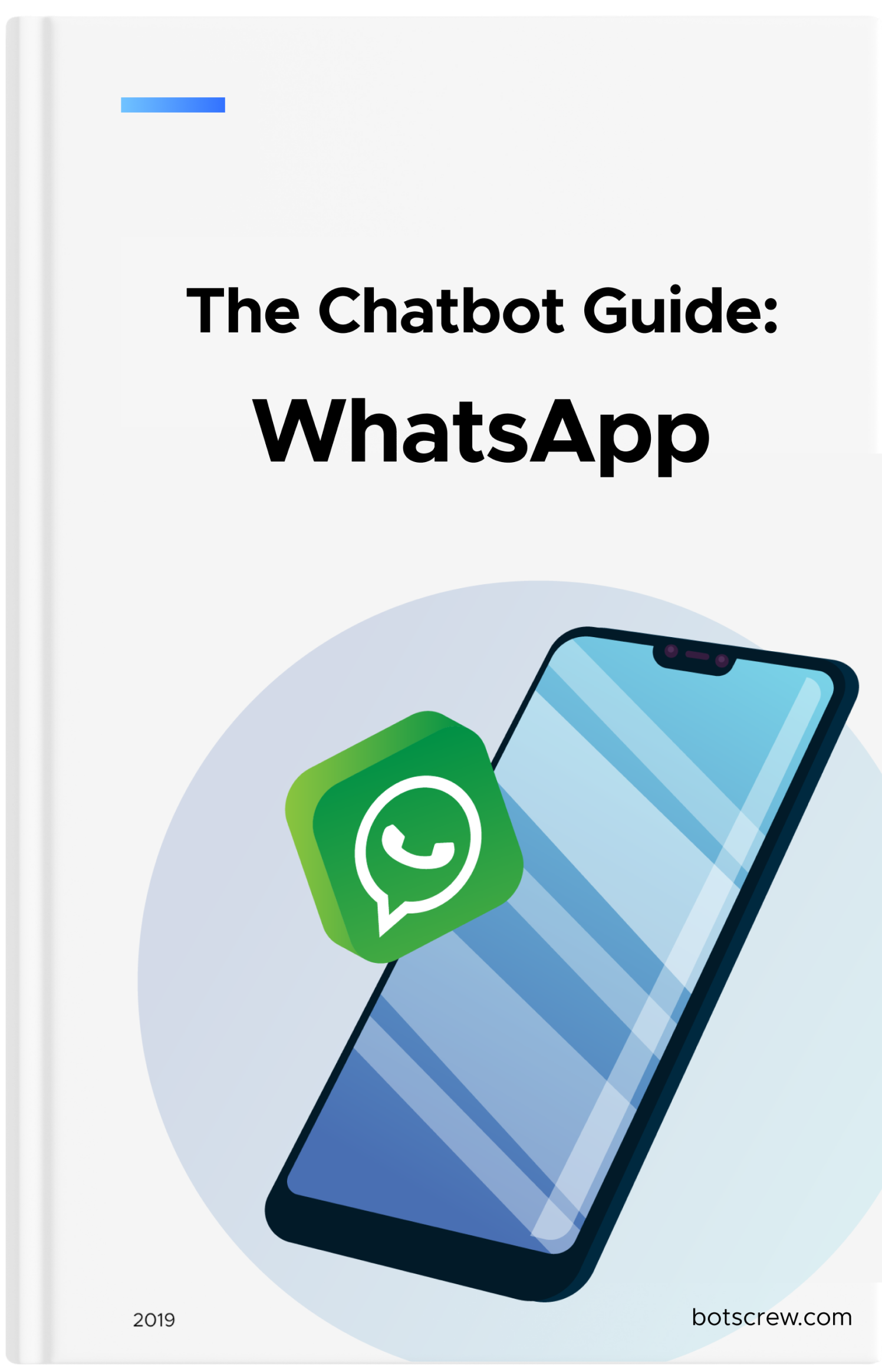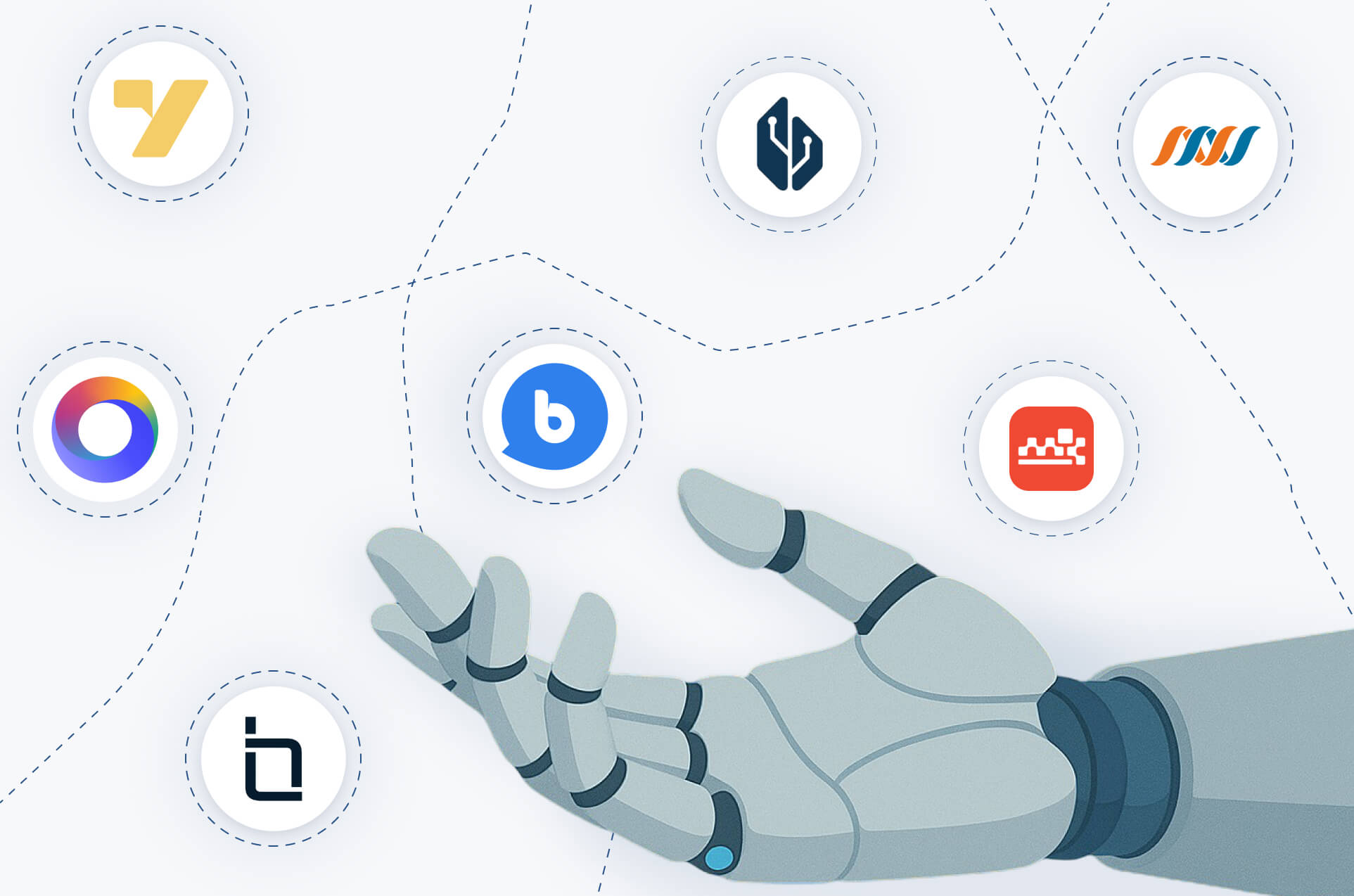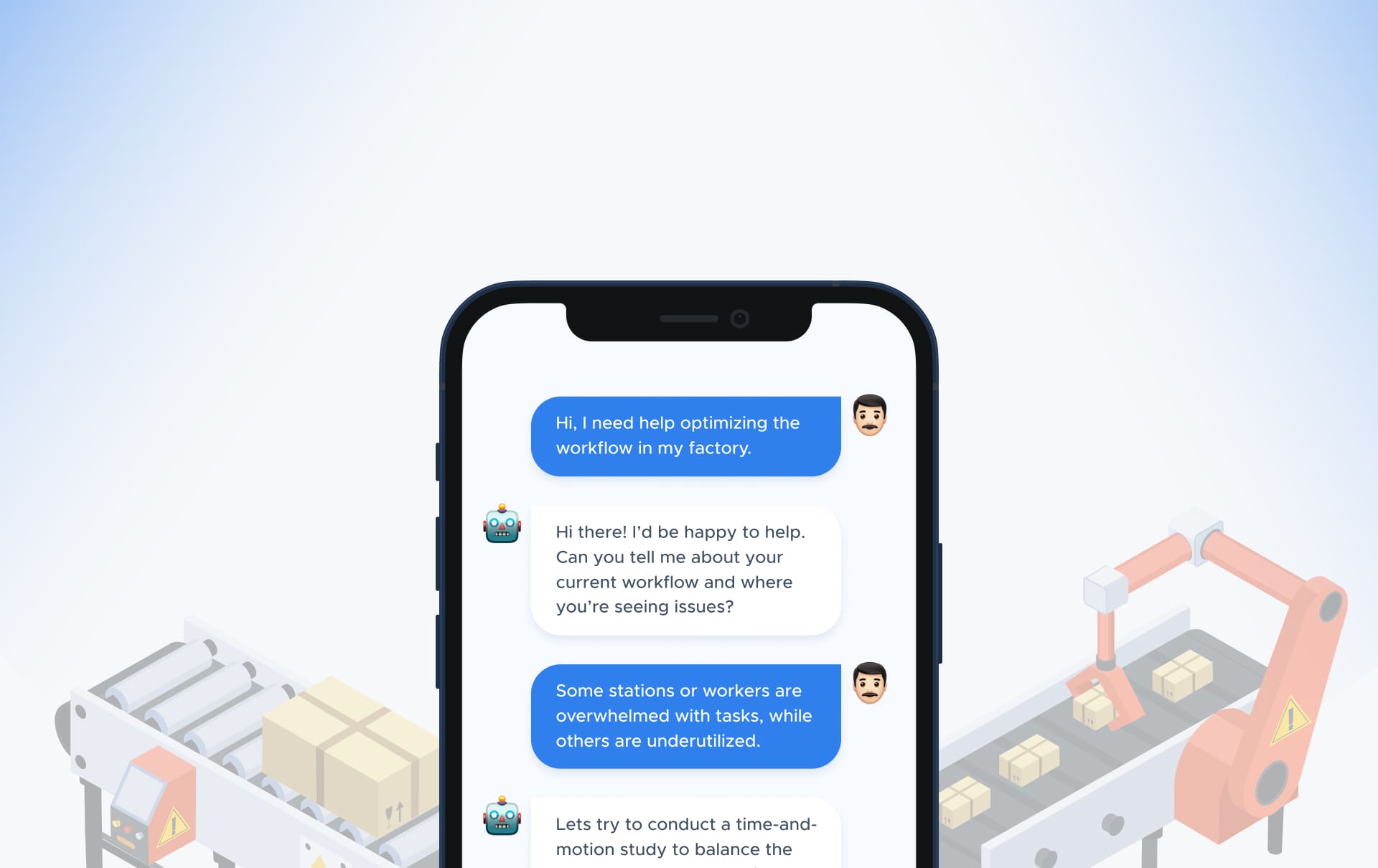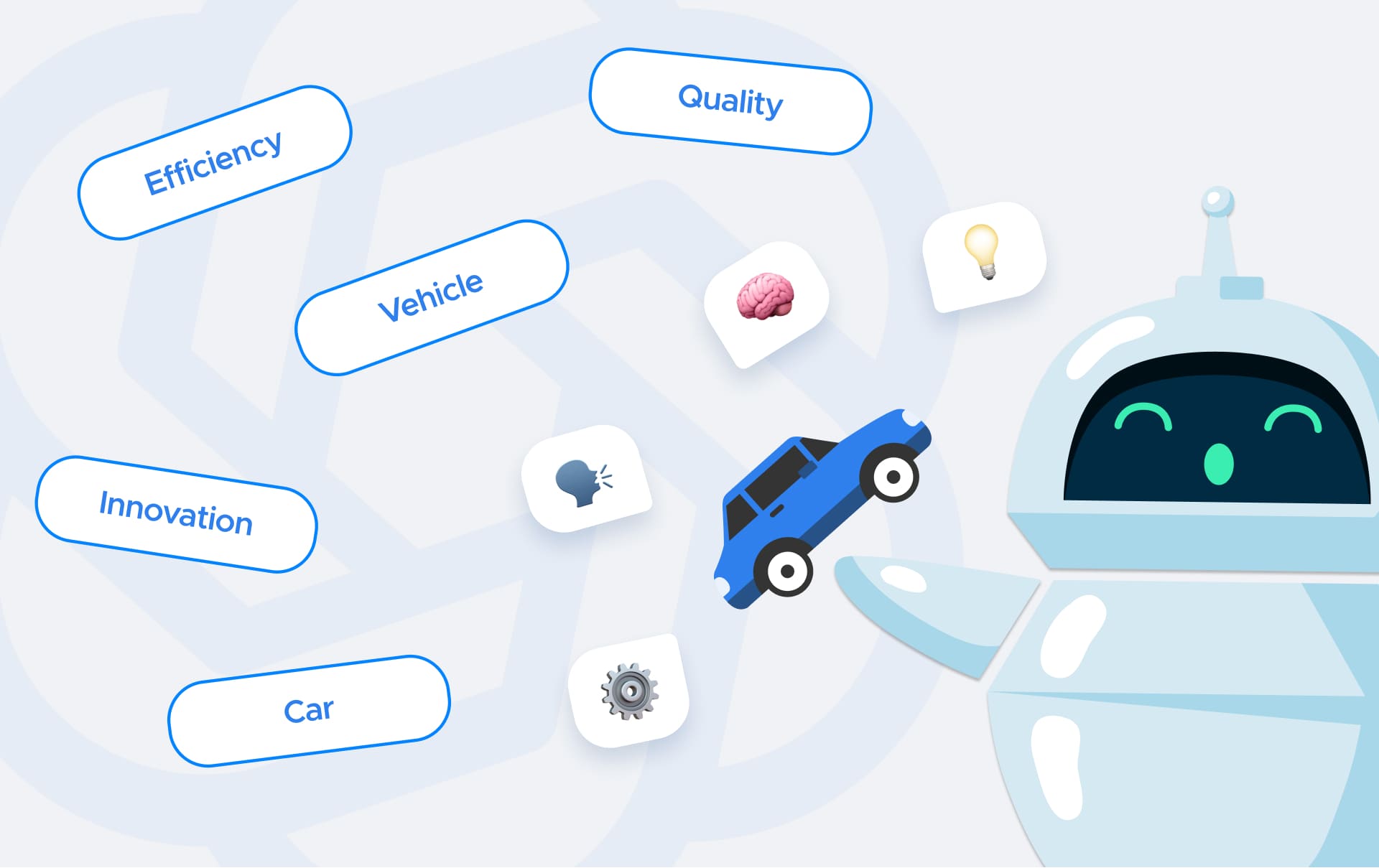Automotive Artificial Intelligence for Dealerships & MaaS Providers
How automotive artificial intelligence is reshaping mobility — from smart dealerships and shared fleets to connected cabins and autonomous logistics.
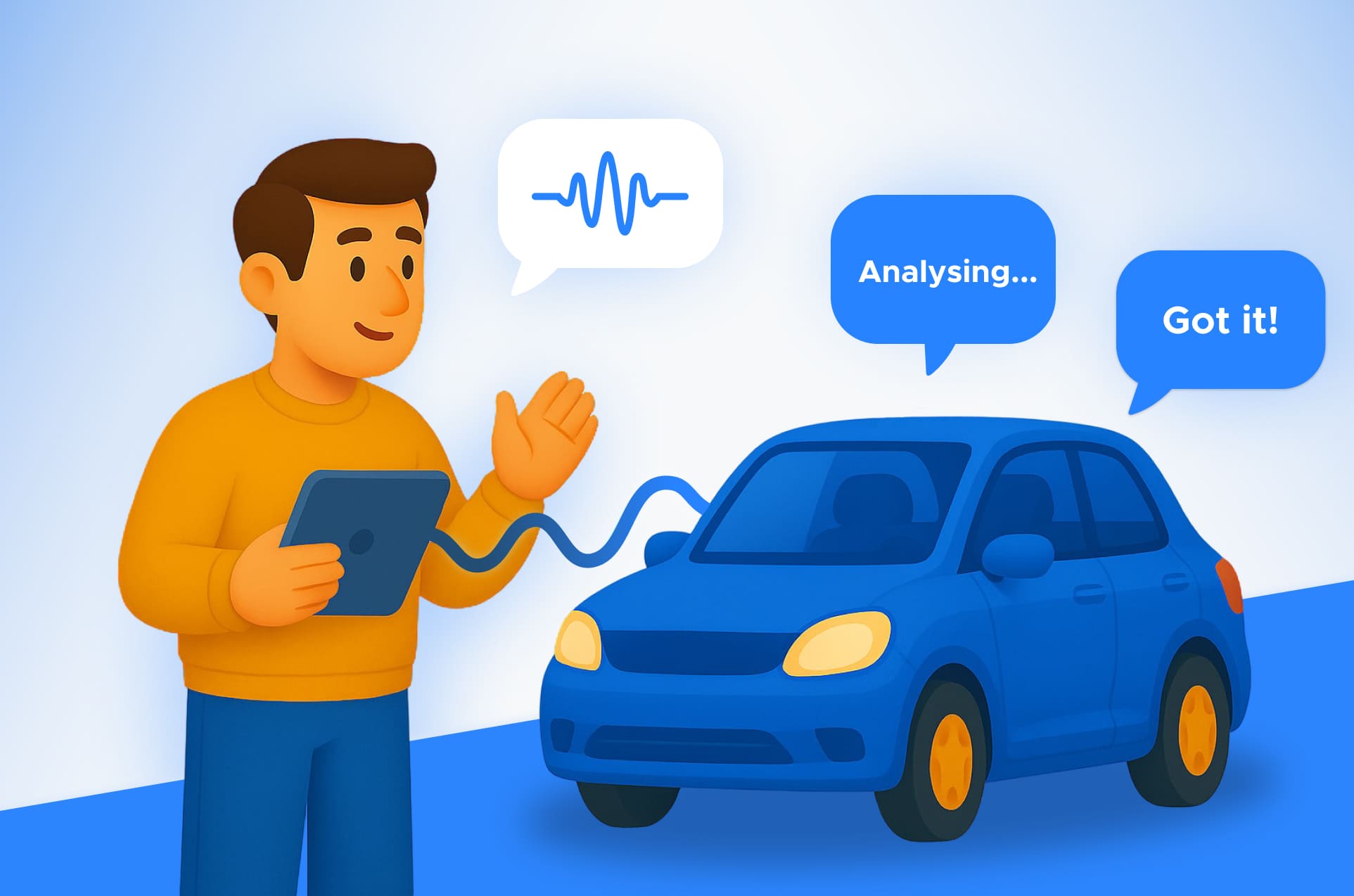
A 2025 Global Automotive Consumer Study by Deloitte Insights revealed that 65% of consumers in Germany, the US, and the UK believe adding artificial intelligence to vehicle systems is beneficial. From intelligent voice assistants to real-time driver support, expectations are shifting fast. Consumers now view AI as a baseline feature in their next vehicle.
AI is stepping in as a support tool and a strategic asset. We're seeing intelligent systems optimize supply chains, detect potential vehicle failures before they happen, and even adapt driving behaviors to reduce accidents.
In this article, we explore how automotive artificial intelligence transforms the industry. We'll dive into the trends, technologies, and use cases that matter most to:
🚗 Car dealerships
🚚 Logistics and fleet providers
🚘 Mobility-as-a-Service (MaaS) platforms, etc.
Benefits of AI in the Automotive Industry For Dealerships, Logistics, MaaS, and Integration Partners
While consumer-facing AI features like voice assistants and personalization make headlines, the real game-changer lies in how artificial intelligence in the automotive industry is revolutionizing business models, operations, and growth opportunities for dealerships, fleet operators, MaaS platforms, and technology integrators.
1. New Revenue Streams Beyond Vehicle Sales
Car dealerships and MaaS providers are no longer limited to one-time vehicle sales or rentals. AI enables monetization through ongoing digital services and software subscriptions — such as advanced driver assistance packages, premium navigation, or personalized mobility features.
For instance, BMW offers features like steering assist and automatic high beams through a subscription. Dealerships can offer tailored AI-powered upgrades or maintenance plans based on driver behavior and vehicle usage patterns.
Logistics companies benefit by using AI to optimize asset utilization and offer value-added services like predictive maintenance or route optimization subscriptions, turning traditional fleets into revenue-generating platforms.
According to McKinsey, up to $1,310 in average annual revenue per vehicle could come from digital services by 2030 — a primarily driven largely by AI-enabled software.
2. Exceptional Customer Experiences with Reduced Wait Times
Long waits on phone calls, slow email replies, and confusing scheduling frustrate customers lead to lost business and weaker loyalty.
Voice AI agents and chatbots instantly answer FAQs on inventory, financing, service availability, and dealership hours. These AI assistants handle common questions autonomously, escalating only complex queries to human agents, which frees your team to focus on what matters most.
Thanks to natural language understanding capabilities, AI assistants can converse naturally, recognizing different accents and languages for a smooth, personalized customer experience.
3. Smarter Operations and Better Customer Engagement With Real-Time Data
AI-powered vehicles and connected fleets generate vast amounts of real-time data. For logistics providers and MaaS operators, this data enables predictive maintenance, dynamic routing, and demand forecasting — driving efficiency and reducing operational costs.
Dealerships can use AI analytics to personalize customer interactions, recommend relevant services, and streamline inventory management.
For AI consultants and integrators, this data ecosystem offers opportunities to build sophisticated platforms that unify telematics, CRM, and service management systems — enabling smarter, data-driven decision-making across the automotive value chain.
4. Enhanced Compliance, ESG, and Sustainability Initiatives
Environmental regulations and ESG reporting requirements are tightening globally, particularly in Europe, Australia, Israel, and North America. AI helps logistics fleets and MaaS platforms automatically optimize energy consumption, reduce emissions, and monitor sustainability metrics.
Dealerships gain an edge by offering eco-friendly vehicle options and leveraging AI to educate customers on greener driving habits. AI also supports compliance reporting by automating data collection and auditing processes — saving time and reducing risks.
Looking to future-proof your automotive business? Whether you're leading digital transformation at a dealership group or scaling innovation across a vehicle marketplace, let's turn your vision into a real competitive advantage.
5. More Scalable Infrastructure for Autonomous and Shared Mobility
AI is foundational to the future of autonomous vehicles, robo-taxis, shared fleets, and Vehicle-to-Everything (V2X) connectivity.
- Dealerships preparing for electric and autonomous vehicle sales need AI-powered tools for vehicle diagnostics, customer education, and after-sales digital services.
- Logistics and fleet operators benefit from AI-enabled autonomous trucks and dynamic fleet management.
- MaaS platforms rely on AI for fleet optimization, dynamic pricing, and real-time rebalancing to meet urban mobility demands.
- Consultants and integration partners play a crucial role in designing and implementing the complex AI ecosystems that connect these capabilities.
According to ZipDo, approximately 90% of new vehicles are expected to incorporate some form of AI by 2030, underscoring the critical need to invest in AI infrastructure.
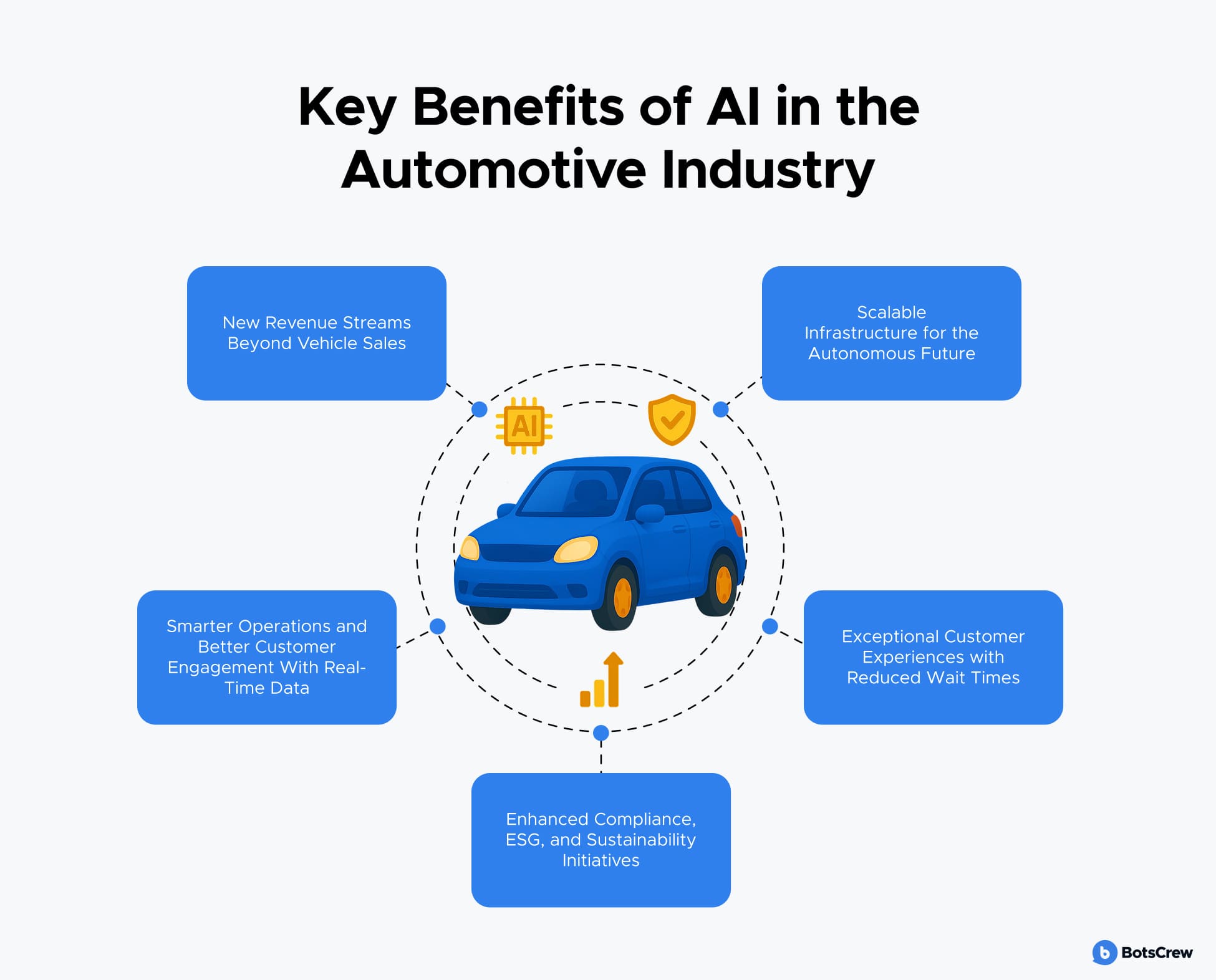
AI for Car Dealerships & Beyond: Practical AI Applications
Automotive businesses are rapidly adopting AI to stay competitive in a market that demands speed, personalization, and seamless customer engagement:
✅ Conversational AI for car dealerships for Lead Qualification and 24/7 Sales Chats. Conversational AI chatbots have become indispensable for capturing and qualifying leads around the clock. These AI-powered virtual assistants engage visitors on dealership websites, answer FAQs instantly, and guide potential buyers through the early stages of the sales funnel.
By automating lead qualification, dealerships can respond faster and ensure no opportunity slips through the cracks — even outside business hours. This results in higher lead conversion rates and more efficient sales cycles.
✅ AI-Powered Appointment Scheduling for Test Drives and Service. AI-driven scheduling tools integrate with dealership calendars to offer real-time availability and allow customers to book test drives or service visits effortlessly. These systems send automated reminders, reduce no-shows, and optimize staff workloads, improving overall customer satisfaction and operational efficiency.
✅ Voice Agents for Handling Incoming Phone Inquiries. Voice AI agents are transforming traditional phone support by handling common inquiries autonomously. Intelligent assistants can answer questions about inventory, pricing, financing options, and dealership hours, routing complex calls to human agents. This technology ensures faster response times, reduces call center burdens, and improves customer experience.
✅ AI Assistants for Vehicle Trade-In Value Estimation. Estimating trade-in values can be complex and time-consuming. AI for dealerships uses market data, vehicle condition reports, and historical sales trends to provide accurate, real-time trade-in valuations. This transparency builds customer trust, speeds up negotiations, and helps dealers make informed purchasing decisions.
✅ AI Solutions for Marketing. AI is reinventing how automotive brands connect with customers. From hyper-personalized content to predictive targeting and always-on engagement, artificial intelligence empowers dealerships, OEMs, and mobility providers to run marketing that's automated and strategic.
AI tools can generate headlines, email copy, social ads, and landing page content in seconds. Need ten versions of a seasonal promotion or a localized service campaign? Beyond awareness, AI solutions can actively support conversion: answering questions and surfacing offers.
To support the launch of the new HR-V, Honda Australia introduced Honda Harvey, a conversational AI assistant built to engage younger, tech-savvy buyers. Accessible via a landing page, Facebook Messenger, and Google Assistant, Harvey could chat about everything from boot capacity and fuel economy to dating advice — covering over 300 topics with proactive prompts to guide unsure users.
The results:
— 15,000 conversations in just 3 months
— 4+ minutes average session time
— Up to 30% boost in lead conversions for dealerships using Harvey.
With Harvey, Honda turned the traditional buying experience into a playful, personalized journey — proving that when a car sells itself, people listen.
The Future Is Now: Automotive Artificial Intelligence Trends to Watch
Nowadays, we are seeing a shift from experimental pilots to full-scale deployments, with AI embedded in everything from design and manufacturing to in-cabin experiences and after-sales support. Below, we explore the most essential AI trends reshaping the automotive landscape this year.
💬 Conversational AI Assistants Become Standard Issue
Basic command-based voice recognition has evolved into fully conversational AI, powered by large language models (LLMs) fine-tuned for automotive use cases.
Take Mercedes-Benz's MBUX system as a benchmark. In 2023, it integrated ChatGPT to enhance natural language understanding. By 2025, it can handle multi-turn conversations, recognize context, and integrate with third-party services like calendars and charging networks. Drivers can say, “Hey Mercedes, I have a meeting in 20 minutes — find the fastest route with a quiet place nearby to take the call,” and get a fully contextualized response.
Toyota's Intelligent Assistant takes it further by learning driver behavior over time. It picks up accents, adapts to preferred languages, and refines suggestions based on previous interactions. And the assistant grows smarter with each drive!
Chatbots and voice assistants aren't just for customers — they become everyday sidekicks for transport company employees too, streamlining everything from dispatch requests to incident reporting with a simple message or voice command.
We've worked with a transportation company that aims to streamline its trucking operations by replacing manual workflows with a chatbot on drivers' preferred messaging platform. The goal is to automate 60% of the 200+ daily driver requests, including check-ins, fuel, and rescue.
The chatbot now connects to the company's database and Zoho Desk, guiding drivers through tasks like submitting mileage, uploading odometer photos, and reporting incidents. It verifies the data automatically and creates support tickets when needed, with real-time updates on approvals.
Now used by over 500 drivers, the chatbot has reduced manual workload, improved visibility, and enhanced the overall driver experience.
🛡 AI-Driven Safety Systems Go from Reactive to Predictive
Safety has always been non-negotiable in automotive, but AI in the car industry is shifting from passive protection to active prevention. Today's advanced driver-assistance systems (ADAS) don't just detect obstacles. They understand complex driving environments in real-time.
For instance, Bosch has deployed AI-enhanced systems that can recognize wrong-way drivers on highways and alert nearby vehicles seconds earlier than traditional radar alone — a critical time in a high-speed scenario.
In-car AI systems go far beyond voice commands, actively supporting drivers by detecting traffic slowdowns, adjusting to weather changes, suggesting the fastest route, or even handling payments while you drive. Audi's virtual assistant, for example, can calculate the ideal speed to cruise through green lights.
🎼 Infotainment Redefines the Driving Experience
Manufacturers enhance their vehicles with various AI-powered applications to upgrade the passenger experience.
Some in-car AI systems now go as far as monitoring facial expressions and emotional cues to assess the driver's alertness or the passengers' comfort. Others tap into natural language processing (NLP) and natural language generation (NLG) to power voice assistants that can play a favorite playlist, stream a movie, or even place an order.
Infotainment systems are expected to account for over $30B in global automotive software revenue by 2026.
Dentsu and Hyundai invested $10 million in Audioburst, an AI-driven infotainment platform. Using automatic speech recognition and advanced language understanding, it lets passengers search massive audio libraries, get personalized news and music, and enjoy an experience that feels more like a smart home than a car.
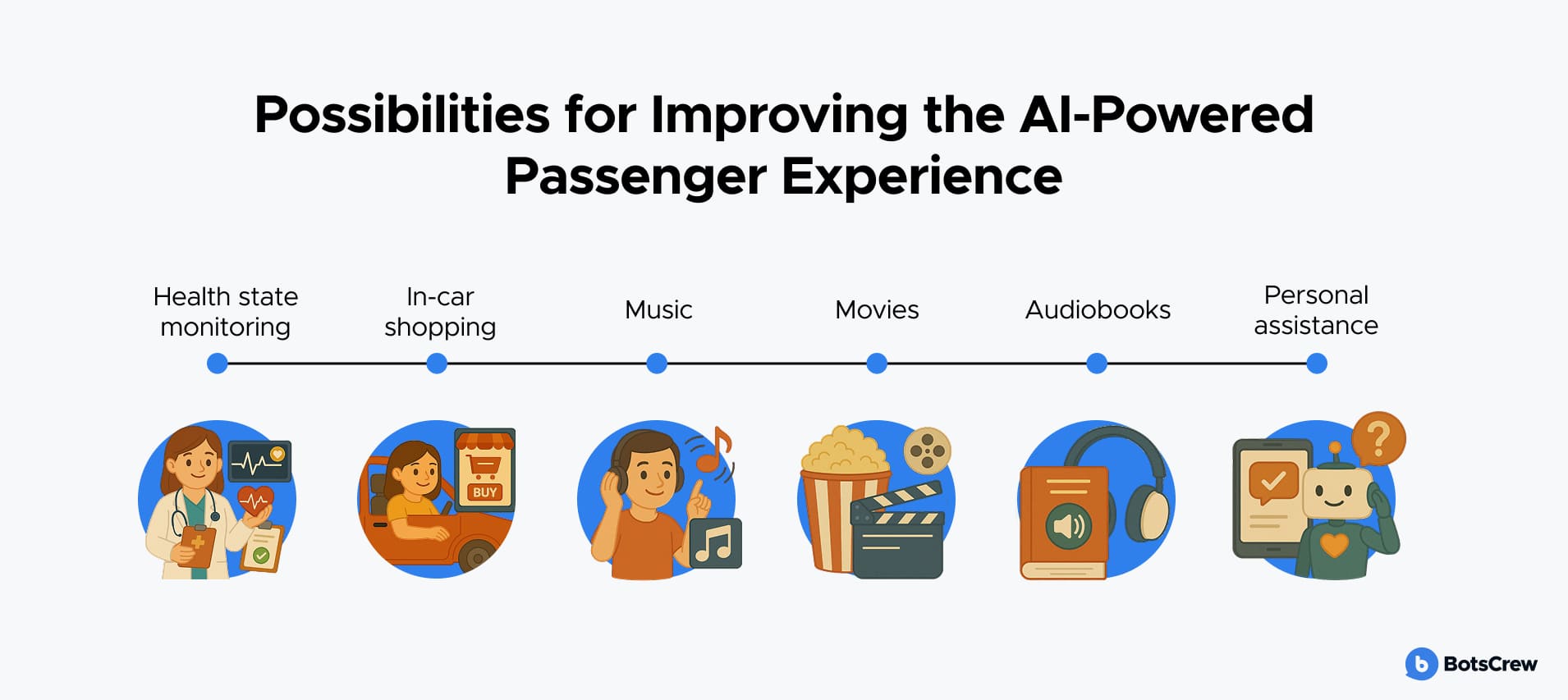
🚗 Traditional Dealerships Are Transforming Into Intelligent Retail Spaces
With conversational AI for dealerships, companies are no longer bound by business hours. Intelligent chatbots and virtual assistants now handle everything from product inquiries to financing pre-approvals 24/7, creating seamless omnichannel experiences.
With AI for automotive dealerships, companies now automatically score, prioritize, and follow up with leads. Dealerships report shorter sales cycles thanks to intelligent lead nurturing that keeps prospects engaged with minimal human intervention.
Lastly, instead of one-size-fits-all offers, generative AI in automotive is crafting dynamic, hyper-personalized vehicle recommendations, content, and upsell options based on a buyer's online behavior, location, preferences, and even voice interactions.
📦 From Fleet Monitoring to Autonomous Dispatch in Logistics
The logistics sector is undergoing a digital transformation powered by AI — turning reactive operations into highly proactive, optimized systems. Predictive Maintenance is one of the standout AI applications.
Using vast streams of sensor data from vehicle telematics, AI algorithms analyze patterns that indicate wear and tear long before a breakdown happens. This allows fleet managers to schedule maintenance and avoid costly downtime and expensive emergency repairs.
AI-powered Routing and Dispatch has evolved far beyond static route planning. Real-time traffic data, weather conditions, road hazards, and even last-minute order changes are dynamically factored into optimized delivery schedules.
AI tools automatically reroute vehicles mid-journey to avoid congestion or delays, ensuring faster deliveries and fuel savings. Amazon and UPS have pioneered these smart logistics models, saving millions in operational costs.
🚘 AI-Powered Mobility-as-a-Service (MaaS)
Mobility-as-a-Service platforms are transforming urban transport, with AI at the core. AI-driven dynamic pricing adjusts ride and subscription costs in real time based on demand, vehicle availability, and environmental factors, optimizing revenue and balancing supply.
Intelligent vehicle matching recommends the best ride type — like an electric scooter for short trips or a shared EV for longer ones — boosting efficiency and reducing emissions.
AI also enables real-time fleet rebalancing by monitoring locations and traffic to reduce wait times and improve utilization. Plus, it tracks energy use and emissions, helping meet sustainability goals. Together, these AI tools make MaaS platforms smarter, greener, and more user-friendly.
🚀 Ready to Drive the Future with AI? Whether you're a supplier developing next-gen safety systems or a mobility startup integrating embedded AI, generic solutions won't cut it. Our team combines deep technical expertise, industry insight, and proven deployment experience to power your success. Reach out to schedule a free strategic consultation or product discovery session.
How BotsCrew Can Accelerate Your AI for Automotive
At BotsCrew, we engineer tailored, future-ready solutions designed to drive real value in the automotive space. How we can help you bring your AI vision to life:
🔍 Deep AI Expertise. Our team stays on the cutting edge of AI advancements — from fine-tuning large language models to experimenting with the latest ML algorithms. This constant R&D mindset ensures we are always ready for emerging challenges and ahead of the curve.
🔄 End-to-End Development. From market research and requirement gathering to development, testing, and post-release support — we cover the entire product lifecycle.
🔐 Built-In Security, Every Step of the Way. We go beyond standard protocols to ensure your software and user data stay safe from day one.
✅ Quality-First Approach. Continuous testing, code reviews, and performance checks help us deliver solutions that are not just functional — but production-grade from the start.
🚗 AI Expertise for Car Dealerships. We've partnered with innovative dealerships to deliver AI solutions that drive real results — from NLP-powered sales assistants to predictive inventory tools. Whether you aim to shorten sales cycles, boost service bookings, or automate workflows, we'll help you get there faster.
The Business Research Company forecasts the global automotive AI market will reach $18.43 billion by 2029, highlighting massive growth potential and a clear signal that AI adoption will shape the industry's future.
Ready to future-proof your automotive software? Partner with us to build AI solutions that streamline operations, enhance customer experience, and give your dealership, fleet, or OEM a competitive edge.




